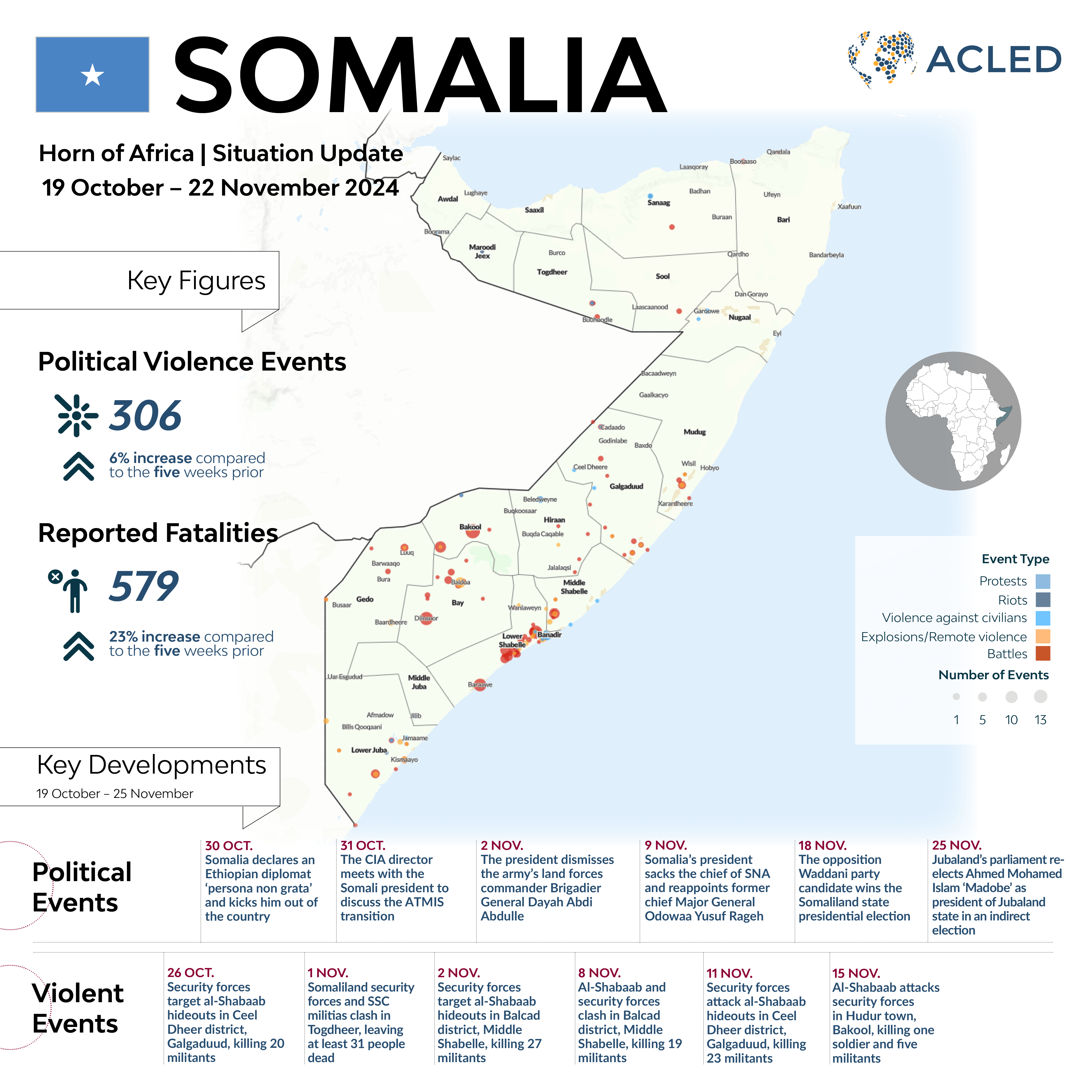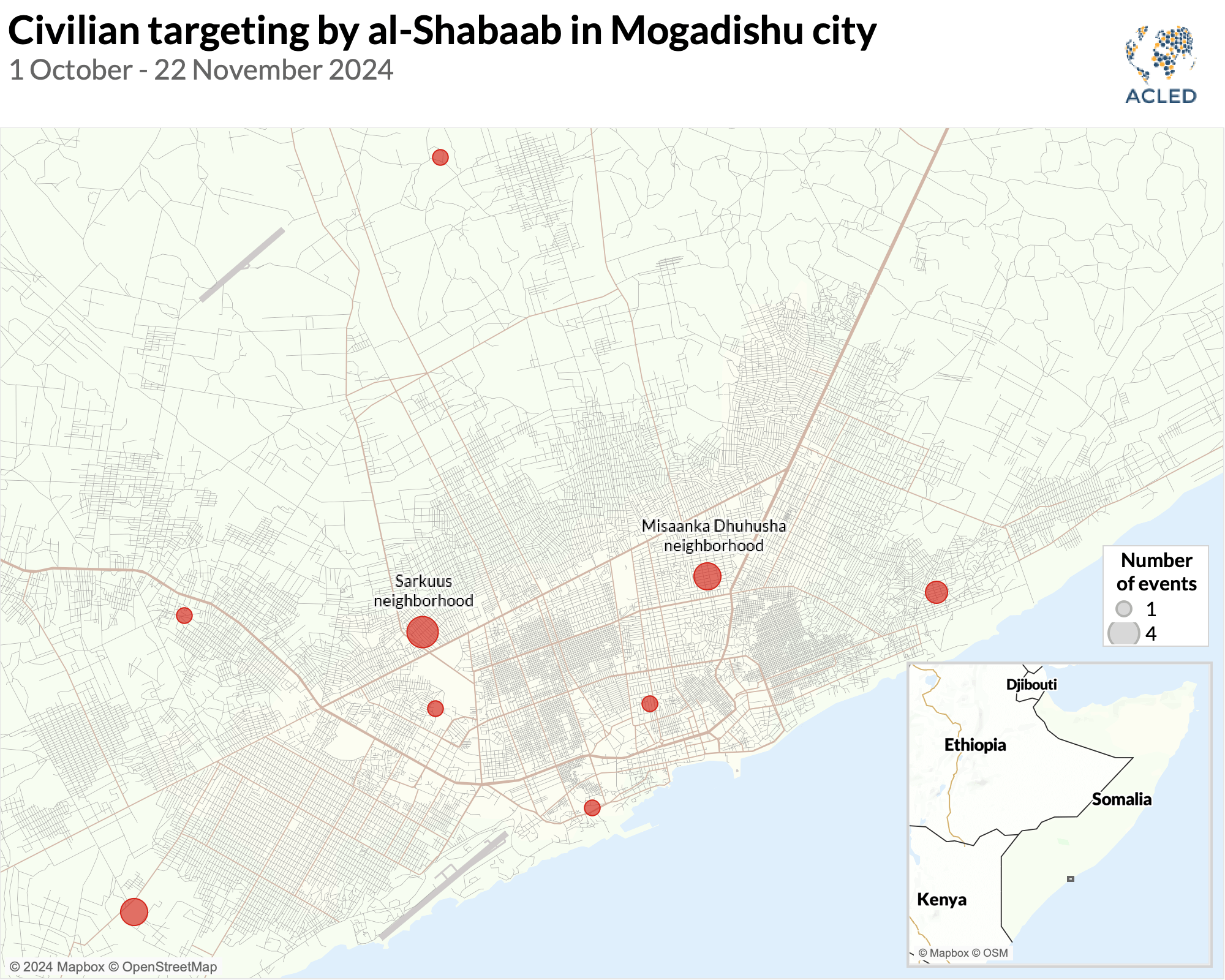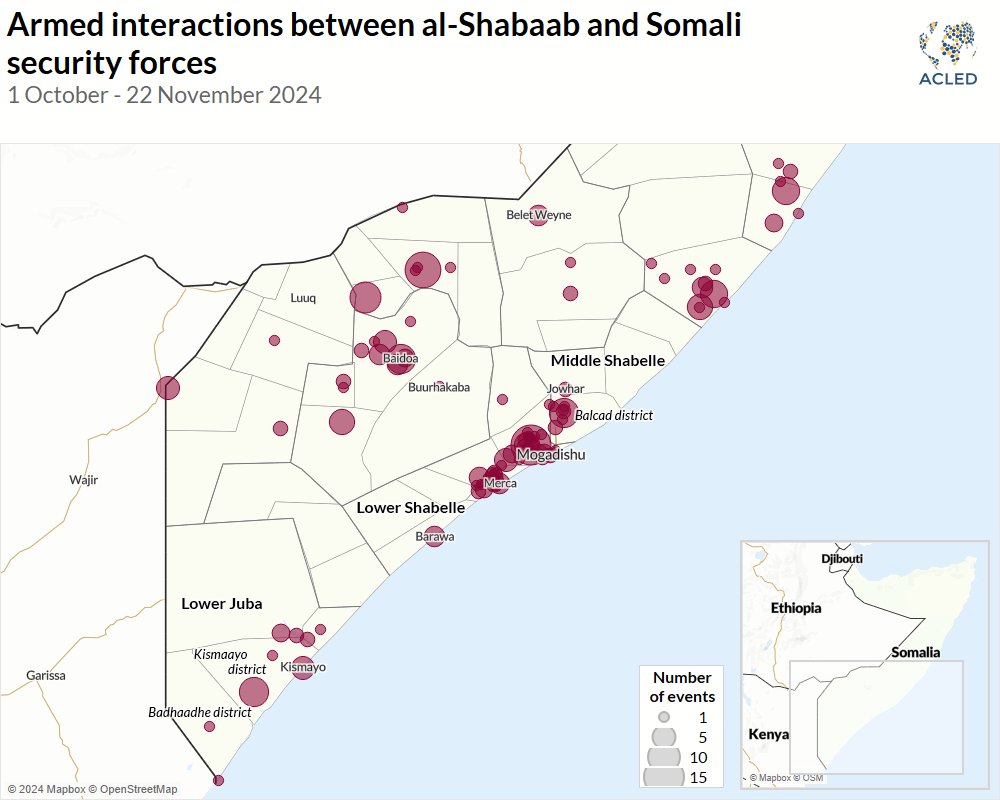Situation Update | November 2024
Al-Shabaab targets civilians in Somalia in retaliation for installing CCTV cameras
29 November 2024
Somalia at a Glance: 19 October – 22 November 2024
VITAL TRENDS
- ACLED records 306 political violence events and 579 reported fatalities from 19 October to 22 November.1Due to reporting delays, these figures may change in the next data release. ACLED is a living dataset and exact figures are subject to change as new information becomes available Most political violence centered in Lower Shabelle region, where al-Shabaab attacks targeting security forces and the African Union Transition Mission in Somalia (ATMIS) remained at high levels.
- Galgaduud region had the highest number of reported fatalities, with 135 recorded during the reporting period. Lower Juba region followed, with 100 reported fatalities.
- The most common event type was battles, with over 211 events, followed by explosions/remote violence with 61 events. Most of the battles recorded — 67% — were between al-Shabaab and security forces, including ATMIS.

Al-Shabaab targets civilians in Somalia in retaliation for installing CCTV cameras
Al-Shabaab militants increased targeting of civilians in Mogadishu, particularly in response to the Somali government’s mandate for businesses to install CCTV surveillance systems in the capital city. Most of these attacks targeted business centers where cameras were installed and their owners, creating a climate of fear and uncertainty. Elsewhere, Somali security forces made significant efforts in their counter-insurgency operations against al-Shabaab, particularly in targeting senior al-Shabaab members. Meanwhile, further tensions between the federal government and Jubaland escalated over the regional elections. Elections in Somaliland resulted in the Somaliland National Party — known as Waddani — presidential candidate, Abdirahman Mohamed Abdullahi ‘Irro,’ winning the vote to become the sixth president of the region in November.
Al-Shabaab target against business centers amid government surveillance push
Since October, ACLED records 10 al-Shabaab attacks against business centers and owners in Mogadishu. These attacks are linked with the Somali government’s directive for all businesses in Mogadishu to install surveillance cameras or CCTV. This decision, launched in 2023, aims to limit al-Shabaab’s activities in one of the largest markets in Mogadishu.2Abdi Sheikh, ‘Somalia security cameras aim to cut al Shabaab attacks but militants fight back,’ Reuters, 24 October 2024; ADF, ‘Security Cameras Aim to Prevent Al-Shabaab Attacks, ‘ 12 November 2024 Every month, al-Shabaab operatives extort money from all the businesses operating in the capital as a form of tax. The government aims to use the CCTV footage to enhance surveillance, enabling the identification and tracking of al-Shabaab militants, ultimately disrupting the militants’ activities in Mogadishu and sources of financing.
Al-Shabaab ordered business owners not to comply with the government directives.3Shabelle Media, ‘Al-Shabaab targets CCTV cameras at businesses doors in Mogadishu,’ 11 November 2023 Many business owners have found themselves caught between a rock and a hard place: fearing al-Shabaab’s retaliation while attempting to adhere to the government’s mandate. On 29 October, local markets and businesses were closed in Yaqshid and Heliwa districts due to al-Shabaab attacks. Some of the businesses in Mogadishu complied with the government mandate, while others have chosen not to install the CCTV to avoid becoming al-Shabaab targets. This has forced many businesses in Mogadishu’s main markets to close their doors for days.
ACLED records the first al-Shabaab militant attack against the premises of a business that installed CCTV in Mogadishu in November 2023. From 1 October to 22 November, ACLED records 23 political violence events involving the targeting of civilians, resulting in at least 37 reported fatalities in the capital city. Out of these events, 39% are linked with al-Shabaab attacks related to the installation of surveillance cameras. For example, on 28 October, al-Shabaab shot and killed four businessmen in Misaanka Dhuhusha neighborhood, and on 12 November, al-Shabaab shot and killed two civilians in Sarkuus neighborhood (see map below). The situation in Mogadishu highlights the complex and dangerous environment in which civilians conduct their day-to-day lives.
Security forces kill senior al-Shabaab militants
In October and November, operations by Somali security forces in Middle Shabelle, Lower Juba, and Lower Shabelle regions resulted in the killing of several senior al-Shabaab leaders (see map below). Security forces killed around 10 leaders during targeted attacks on al-Shabaab positions in Kismaayo and Badhaadhe in Lower Juba region and Balcad districts in Middle Shabelle region: On 24 and 26 October, two mid-level senior militants were killed in Darken Urur village, Orgiyoow village, and a checkpoint near Kismaayo town in the Kismaayo district. The senior militants were coordinating al-Shabaab activities and operations in the regions, mostly collecting taxes, planting IEDs along the main roads, and conducting surveillance on security forces. On 8 November, in the Middle Shabelle region, security forces killed 19 militants, including three senior militants, in Yaqla village, Balcad district. Previously, the United States and international troops killed most of the top al-Shabaab leaders through airstrikes. The latest such attack by US forces was on 2 April, when an airstrike on an al-Shabaab safehouse killed more than 20 militants, including two al-Shabaab leaders, and injured 30 others. Similarly, on 26 May, international forces, in collaboration with the Somali National Army (SNA), conducted an airstrike against an al-Shabaab hideout in Dul area near al-Madow in Bossas district, Bari region, reportedly killing 20 militants, including three senior leaders. The recent targeted killings of senior militants demonstrate Somali security forces’ increasing ability to attack al-Shabaab leadership directly.
Meanwhile, the federal government changed the SNA leadership to bolster the fight against al-Shabaab. On 9 November, Somalia’s cabinet ministers sacked SNA chief Major General Ibrahim Sheikh Muhyadin Addow4Mohamed Dhaysane, ‘Somali cabinet fires army chief, reappoints predecessor,’ Anadolu Agency, 11 November 2024 and reappointed the former SNA chief, Major General Odowaa Yusuf Rageh, who was sacked in June 2023.5Garowe Online, ‘Somalia President sacks army chief General Odowaa,’ 19 June 2023 The changes to SNA leadership aim to intensify counter-insurgency operations after they declined in November 2023 due to disagreement and corruption between the SNA commander and the Ministry of Defence. The new SNA chief played a vital role in leading and coordinating the first phase of the operation in Hirshabelle and the expansion to Galmudug state. Since he was sacked in June 2023, operation activities have declined, and al-Shabaab regained some of the territory secured by Somali forces. The changes in leadership come as Somali security forces take over bases from the ATMIS ahead of the end of the mission in December.
Election dispute in Jubaland, in stark contrast with successful direct elections in Somaliland
On 13 November, the Somaliland administration conducted presidential elections — using a direct one-person, one-vote, system6Until 2024, there were no political parties in Somalia as the government was elected via indirect clan-based voting using a ‘4.5 power-sharing system.’ Under this system, the four main clans — Hawiye, Darod, Dir, and Rahanweyn — shared the majority οf seats in Parliament, and the remaining 0.5 seats were shared by minority groups. — with the participation of candidates from three parties: the Peace, Unity, and Development party (Kulmiye), the Waddani party, and the Justice and Development Party (UCID).7Hiiraan,’ Somaliland votes in pivotal presidential election, drawing strong turnout,’ 13 November 2024 However, elections were not held in areas controlled by the Sool, Sanaag, and Ceyn Khatumo (SSC-Khatumo) administration in the Sool region and Badhan, Fiqi Fuliye, Yube, and Carmela areas in Sanaag region.8YouTube @BBC Somali,’LIVE: The World and Today, 13 November 2024 Somaliland lost control of these areas to SSC-Khaatumo after fighting between Somaliland forces and SSC militias broke out in December 2022.
Waddani party candidate Abdirahman Mohamed Abdullahi, commonly known as ‘Irro,’ won the Somaliland election with 64% of the votes, with the incumbent president of the Kulmiye party in second place, earning 34%.9Mohamed Sheikh Nor, ‘Opposition leader victorious in self-declared Somaliland elections,’ Voice of America, 20 November 2024 Incumbent President Muse Bihi Abdi accepted the election’s outcome by conceding defeat.10Mogadishu24, ‘Muse Bihi Concedes Somaliland Election, Backs Peaceful Transition,’ 20 November 2024 The elections proceeded without any reported incidents of related violence. However, the Somali government was discontented with how Western diplomats were referring to Somaliland and accused some of them of infringing on Somalia’s national sovereignty, leading to an ongoing diplomatic row with the Danish ambassador.11Garowe Online, ‘Somalia warns diplomats over violations of national sovereignty,’ 16 November 2024; Shabelle Media, ‘Somalia Summons Danish Ambassador Over Sovereignty Issue,’ 17 November 2024
Meanwhile, in Jubaland, the state parliament re-elected the incumbent Jubaland President Ahmed Mohamed Islam ‘Madobe’ on 25 November with 55 votes out of 75 members of the regional parliament. Jubaland’s parliament is composed of members who were appointed by clan leaders through an indirect voting system.12Horn Observer, ‘Ahmed Madobe Re-Elected as Jubaland President for a Five-Year Term,’ 20 November 2024 Ahead of the election, the Jubaland administration deployed additional troops to the Kismaayo town main entrance checkpoints and Kismaayo airport to block security movements and deployments from Mogadishu.13Shabelle Media, ‘Kismayo Security Heightened Amidst Jubaland-FGS Tensions,’ 11 November 2024 The federal government rejected the Jubaland election and the re-election of Madobe14Hiiraan ‘Federal government rejects Ahmed Madobe’s re-election as Jubbaland President, ’26 November 2024 and deployed security forces to Ras Kamboni village with two commercial aircrafts landing at the airfield from Mogadishu. Jubaland also deployed over 300 troops in the same village, and there were reported clashes between security forces loyal to Jubaland and Mogadishu. This deployment increases the friction between the federal government and Jubaland.15Garowe Online, ‘Somalia : Jubaland and Federal Forces Face Off in Raskambooni as Skirmishes Intensify, ’26 November 2024
Before the election, tensions began to rise when Madobe appointed the seven members of the Jubaland Independent Election Commission on 10 November.16Mogadishu24, ‘Jubaland Appoints Independent Election Commission, Escalates Rift with Federal Government,’ 10 November 2024 The federal government rejected these appointments17Garowe Online, ‘Somalia: Hassan Sheikh Rejects Jubaland Election Model He Endorsed During Farmajo-Era,’ 10 November 2024 and called for Jubaland to join the rest of the federal member states in accepting universal suffrage and an extension of the state president’s terms for one year until the implementation of this system.18Garowe Online, ‘Somalia: Hassan Sheikh Rejects Jubaland Election Model He Endorsed During Farmajo-Era,’ 10 November 2024 In return, the Jubaland administration cut ties with the federal government, making it the second administration, after Puntland, to sever relations over constitutional amendments for election-related issues, including introducing universal suffrage instead of the clan-based indirect voting system.
Meanwhile, opposition leaders in Jubaland have threatened to hold a parallel electoral process, which could further escalate tensions.19Brian Otieno, ‘Jubaland opposition rejects appointment of electoral commission,’ 11 November 2024 Jubaland’s decision to hold indirect elections — a move supported by Puntland state and opposition political parties — carries significant weight, as it could lead to the sacking of Prime Minister Hamza Abdi Barre, who faces significant opposition from his home state of Jubaland. If the indirect election is conducted, his position will be at risk: The federal government needs an influential prime minister with support from Jubaland and Puntland, as the current prime minister position is reserved for these two states.20Shabelle Media, ‘Jubaland Sets Presidential Election for November 25, 2024,’ 17 November 2024






